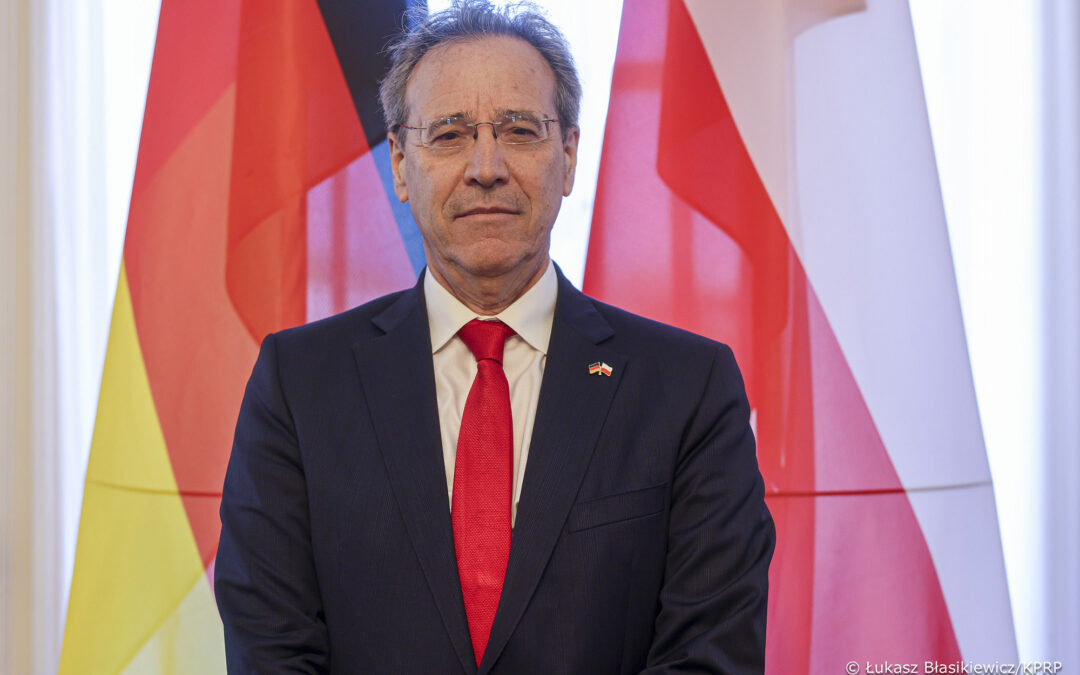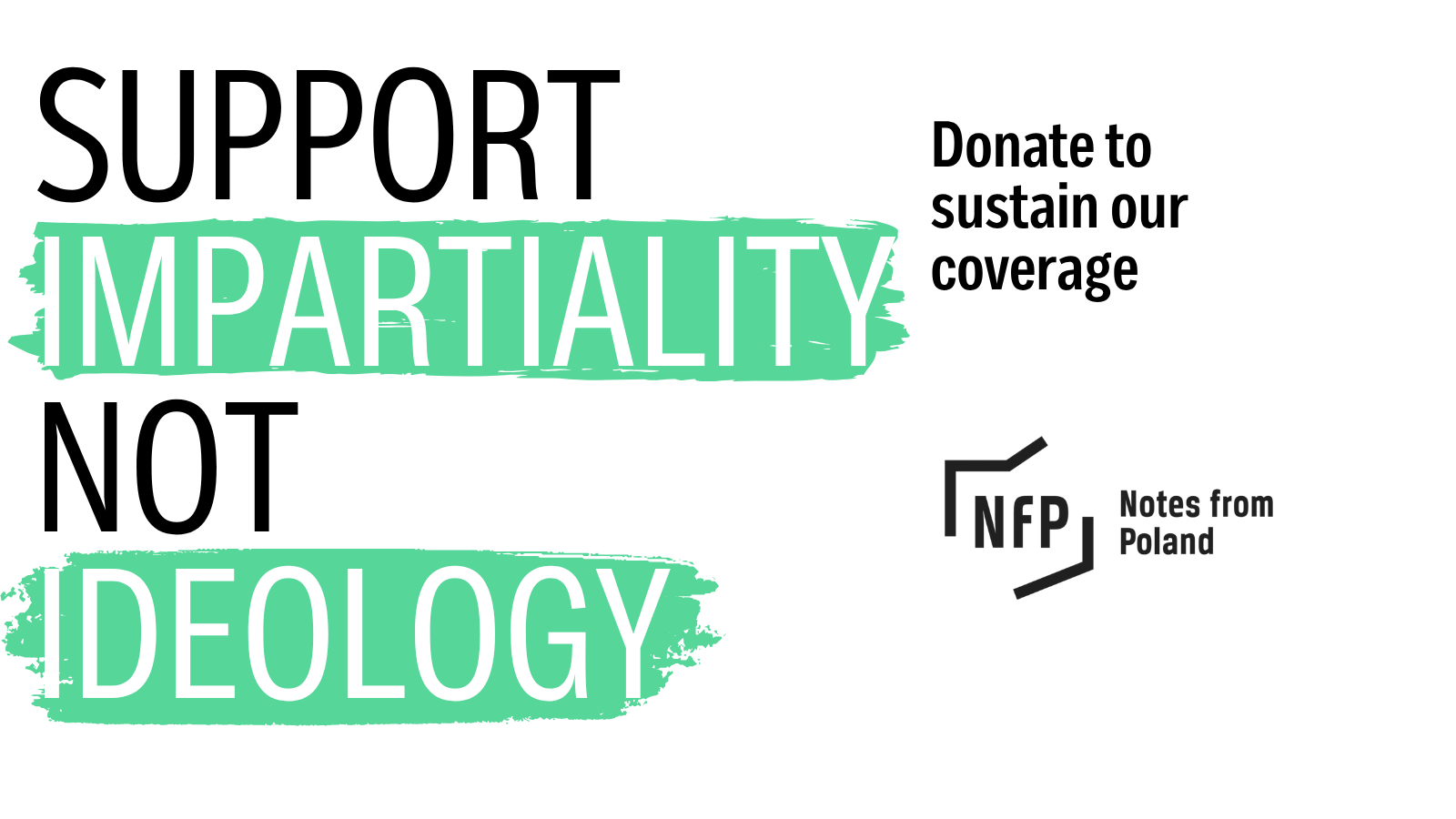Keep our news free from ads and paywalls by making a donation to support our work!

Notes from Poland is run by a small editorial team and is published by an independent, non-profit foundation that is funded through donations from our readers. We cannot do what we do without your support.
The German ambassador to Poland, Miguel Berger, has told a member of the national-conservative opposition Law and Justice (PiS) party that their demands for Germany to pay war reparations stoke “divisions that help only Putin”.
His comments prompted an angry response from PiS figures, as well as from the head of PiS-aligned President Karol Nawrocki’s foreign-policy office. They pointed out that it was Germany which for years pursued closer relations with Moscow and made Europe more reliant on Russian energy.
Szanowny panie pośle, myli się pan sądząc, że pański „raport” i pański aktywizm będą kształtować przyszłość naszych relacji. Ciągłe podziały kreowane przez ludzi takich jak pan, pomagają jedynie Putinowi. https://t.co/EifoTwGxOP
— Miguel Berger (@Amb_Berger) November 15, 2025
The dispute was prompted on Friday, when Berger shared a link on social media to an interview he had given to Polish broadcaster TVN.
The ambassador had been asked about his views on the claim – pushed by PiS when it was in government – that Germany should pay reparations to Poland for the brutal occupation of World War Two.
“Sometimes I have the impression that some people who talk about reparations do so because they perhaps do not want Polish-German relations to develop positively,” responded the ambassador, whose government has repeatedly argued that the question of reparations is already legally closed.
Commenting on Berger’s post, PiS MEP Arkadiusz Mularczyk, who oversaw the former government’s reparations claims, told the ambassador he would “gladly pass on to you personally the report on war losses [that] clearly illustrates the scale of the destruction and the unsettled debt of Germany towards Poland”.
That report, presented by the PiS government in 2022, calculated the value of the losses caused the Nazi-German invasion and occupation of 1939-1945 at $1.3 trillion. Soon after, the Polish foreign ministry sent a demand for reparations to Germany, which was in turn rejected by Berlin.
In response to Mularczyk’s offer, Berger wrote: “You are mistaken in thinking that your ‘report’ and your activism will shape the future of our relations. The constant divisions created by people like you only help Putin.”
Polish President @NawrockiKn has called on Germany to pay Poland war reparations during talks in Berlin with Chancellor @_FriedrichMerz.
In response, Germany has reiterated that it considers the issue to be legally closed and that no reparations are owed https://t.co/sX07qtCFRL
— Notes from Poland 🇵🇱 (@notesfrompoland) September 16, 2025
That prompted an angry response from many PiS figures as well as from senior aides to President Nawrocki, who in September issued a demand for war reparations during his first state visit to Berlin.
The head of Nawrocki’s International Policy Office, Marcin Przydacz, wrote that, “if something helped Putin, it was the existence of the Nord Stream pipelines [bringing gas from Russia to Germany] that you, Mr Ambassador, so decisively defended during many of our official conversations”.
“And I have good news for you: this [war reparations] report exists and will influence the shape of Polish-German relations until Germany fully accounts for the crimes and destruction it committed against my nation and state,” added Przydacz.
Jeśli coś pomagało Putinowi przez całe lata, to istnienie gazociągów Nord Stream I i II, którego tak zdecydowanie bronił Pan Ambasador (wtedy jako wiceminister) podczas kilku naszych oficjalnych rozmów. Proszę więc uprzejmie powstrzymać się od korzystania z tego argumentu.… https://t.co/M44Z2m0WsQ
— Marcin Przydacz (@marcin_przydacz) November 15, 2025
Former PiS Prime Minister Mateusz Morawiecki called on the ambassador to apologise for his “lies”. He noted that it was Germany which had pushed for positive relations with Russia before 2022, made Europe reliant on Russian energy, and thereby funded Putin’s war machine.
Szymon Szynkowski vel Sęk, a former PiS foreign minister, said that Berger had “crossed the line” of what it is appropriate for a diplomat to say.
Poland’s former ambassador to the United States and Israel, Marek Magierowski, likewise said that an ambassador “cannot address a Polish MEP in such a manner”.
Stronię od komentowania wypowiedzi ambasadorów akredytowanych w Warszawie. Jednak tutaj zostały przekroczone pewne granice. Najwyższy przedstawiciel obcego państwa nie może zwracać się do 🇵🇱 europosła w taki sposób. A ujęcie słowa "raport" w cudzysłów budzi moje oburzenie. https://t.co/kiY3YAZqTS
— Marek Magierowski (@mmagierowski) November 15, 2025
Meanwhile, Anna-Maria Żukowska, the head of the parliamentary caucus of The Left (Lewica), which is part of Poland’s current ruling coalition, also reminded Berger that it was Germany which had pushed for Nord Stream.
“It’s a bit awkward in this context to refer to helping Putin, wouldn’t you say?” she asked rhetorically.
Poland’s current government, which has more friendly relations with Germany than PiS, argues that the issue of reparations is now effectively hopeless given Berlin’s position.
However, it has suggested that Germany find other ways to “compensate” Poland for historical wrongs. Yet talks on doing so have so far not yielded any commitments.
The co-leader of the far-right @AfD, Germany's largest opposition party, has suggested that Poland is as much of a threat to his country as Russia is https://t.co/2rhOuDhOtd
— Notes from Poland 🇵🇱 (@notesfrompoland) November 12, 2025

Notes from Poland is run by a small editorial team and published by an independent, non-profit foundation that is funded through donations from our readers. We cannot do what we do without your support.
Main image credit: Łukasz Błasikiewicz/KPRP

Daniel Tilles is editor-in-chief of Notes from Poland. He has written on Polish affairs for a wide range of publications, including Foreign Policy, POLITICO Europe, EUobserver and Dziennik Gazeta Prawna.




















